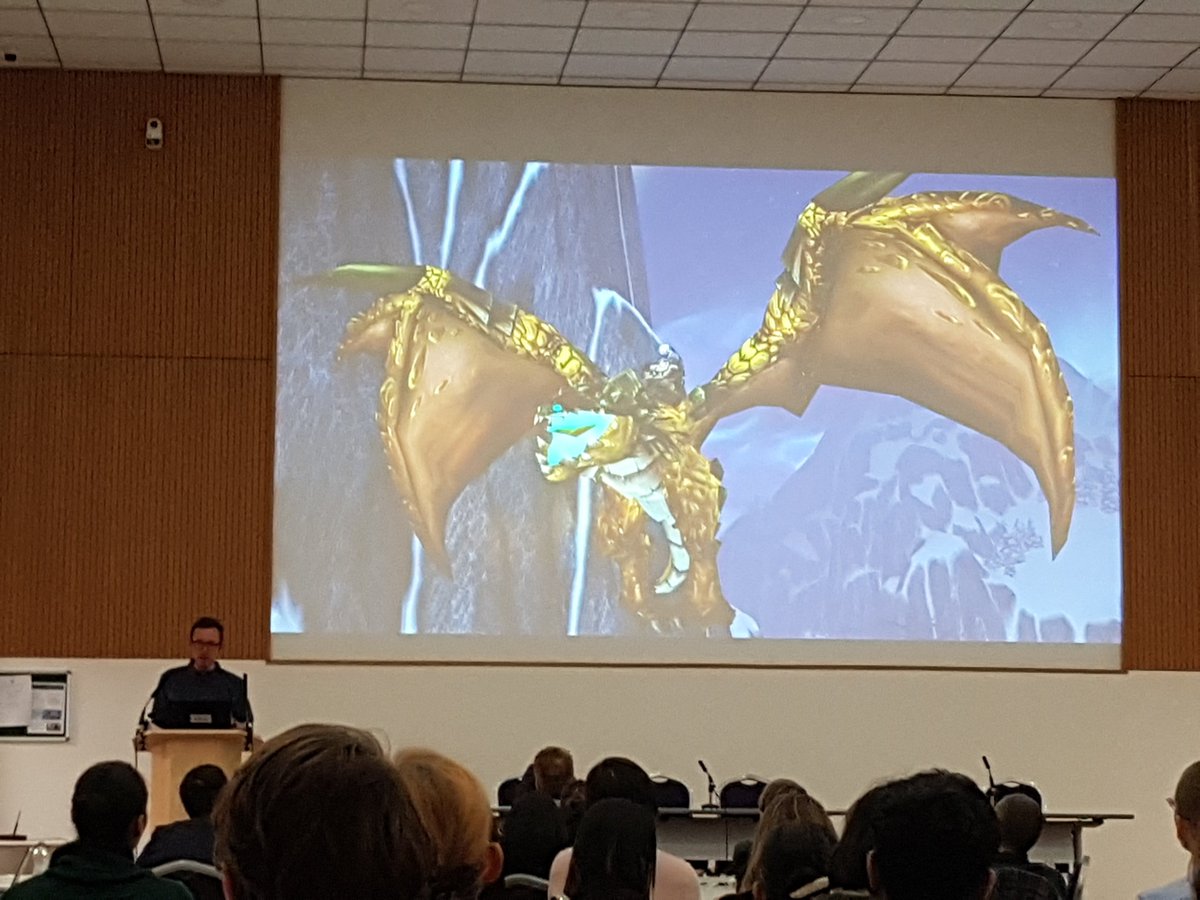Now at #psychtech19 we have @PeteEtchells on concerns regarding video games and aggression. (Thread)
There& #39;s 30 years of experimental studies showing causal relationship between playing violent games and subsequent aggression. But the quality of studies hasn& #39;t been so great.
How do we measure if players go on to be aggressive? We need an appropriate aggression measure.
How do we measure if players go on to be aggressive? We need an appropriate aggression measure.
One experiment is a reaction time task. The participant vs an opponent in who reacts fastest... whoever wins gets to punish their opponent, e.g. by blasting them with noise.
The aggression measure here might be the duration of noise, or volume of noise they chose.
The aggression measure here might be the duration of noise, or volume of noise they chose.
But if you look through the literature, there& #39;s no clear way to analyse this data. There& #39;s been 28 different ways of analysis noted in in one review of studies. There& #39;s no consistency and they may be measuring different things (and this makes meta-analysis difficult).
The way you analyse the data can even affect the finding - whether games cause aggression or they don& #39;t.
Another measure of aggression is how much hot sauce a participant chooses to give someone. This is about as good as our measures get.
It& #39;s also curious what games get chosen as exposure. What counts as a violent game and what counts as non-violent? And a non-violent game like Candy Crush differs from a violent game like Mortal Kombat in many more ways than just violence content...
And what counts as violent? Is Mario violent because he jumps on goombas? Is Pokemon violent? People aren& #39;t even clear on if Minecraft is violent.
There are different aspects which might lead to aggression, like competitiveness, or frustration. So are we really testing what we think we are?
The context of violence matters. A morally ambiguous violence is to kill as many zombies as possible. A morally positive violence is trying to save someone through a bunch of zombies. And these conditions lead to different effects.
Longitudinal studies are useful. The Children of the 90s dataset includes data gaming activity! There& #39;s a *small* association between violent game play at age 8/9 and conduct disorder at 15/16. There& #39;s stronger predictors like mental health symptoms in childhood. @CLOSER_UK
There may be small associations picked up, but they tend to be so small in absolute terms to warrant concern.
We need to improve research using open science, using pre-registered studies (where you state your hypothesis and methodology ahead of time) to prevent HARKing
It frustrates him, that the question of games and aggression are distracting from more important research questions regarding games.
What can games do for us?
What can games do for us?
He discusses @seaheroquest which collects player data to understand spatial navigation behaviour which could give insight into how this declines with normal ageing and dementia, which could lead to early detection tools in the future.
And it has collected 1,700 years of data!
And it has collected 1,700 years of data!
Sea Hero Quest is already showing that our spatial navigation declines sooner than we thought: from 19 onwards. Also there is a gender difference in spatial navigation, but it& #39;s amplified according to level of gender disparity depending on country.
It& #39;s important to consider why people play video games to begin with: it& #39;s not as simple as "games are fun". People have different reasons and their reasons are pretty fluid.
World of Warcraft is a game that people play with varying, changing motivations.
World of Warcraft is a game that people play with varying, changing motivations.
In his book LOST IN A GOOD GAME he interrogates his use of video games as escapism.
But it& #39;s not a question that science has a framework to answer, yet. We can only understand by playing games ourselves and talking to people who do.
But it& #39;s not a question that science has a framework to answer, yet. We can only understand by playing games ourselves and talking to people who do.
He talks about a player who has duchenne muscular dystrophy, and spent much of his time playing video games, which had caused his father concern. He died aged 25, but it emerged after his death how social he had been online. https://www.bbc.co.uk/news/disability-47064773">https://www.bbc.co.uk/news/disa...
Research has not really shown that games cause aggression. But we need more research on why we play games, what negative effects might be, and how this can be balanced with positive effects (which we need to research too).
In the meantime we need to show responsible uncertainty.
In the meantime we need to show responsible uncertainty.
Q: It must be hard treating gaming disorder when you consider how much validation and support games give people
A: There are definitely people who experience harmful effects from games. The data isn& #39;t there however in terms of who they are or how it happens.
A: There are definitely people who experience harmful effects from games. The data isn& #39;t there however in terms of who they are or how it happens.
Q: Are social relationships in games a facade? Does it cause avoidance of real world socialisation?
A: People have different reasons for playing different games at different times. We don& #39;t have nuanced ways of thinking of these questions yet.
A: People have different reasons for playing different games at different times. We don& #39;t have nuanced ways of thinking of these questions yet.

 Read on Twitter
Read on Twitter


